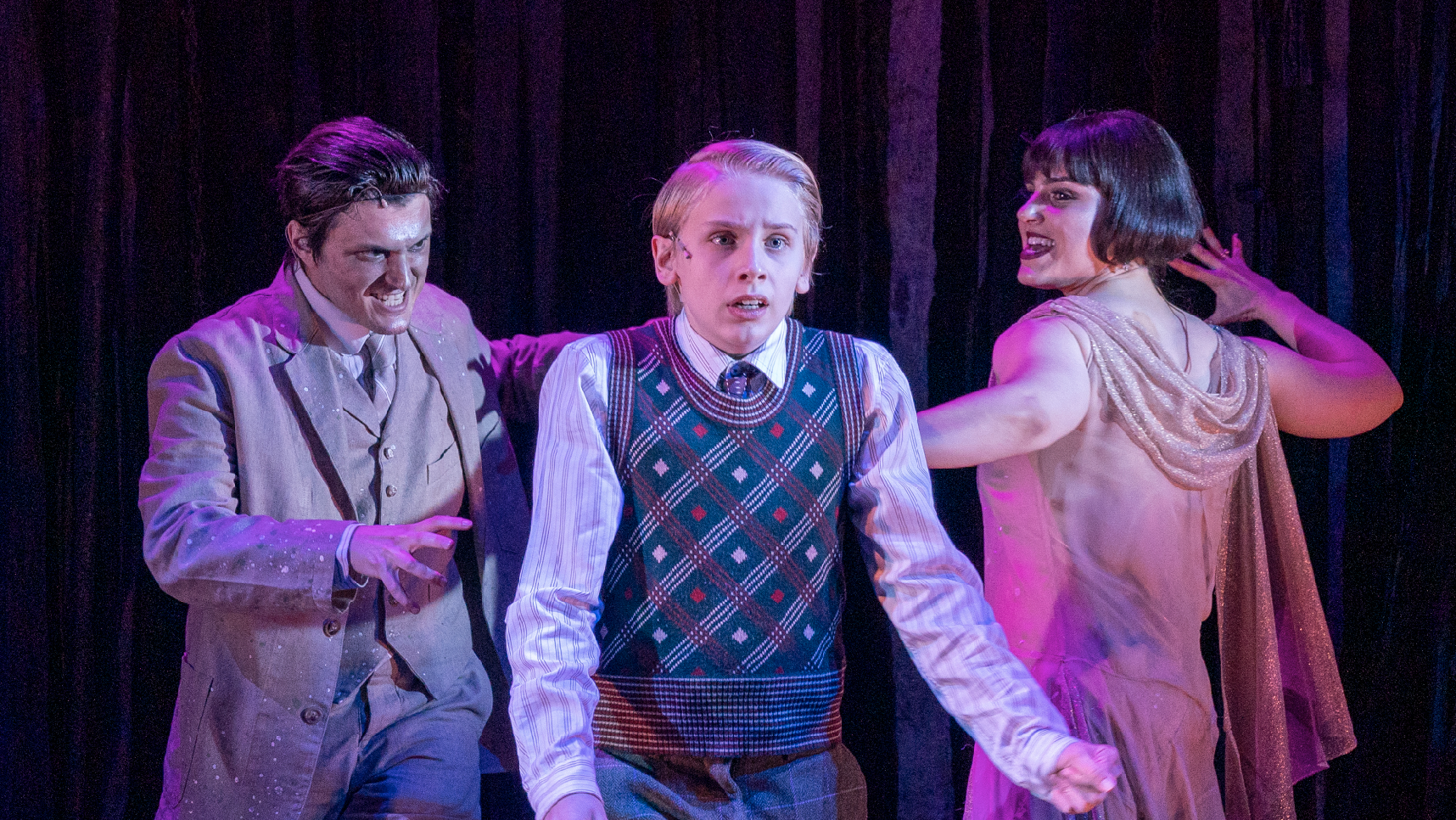Content warning: this article makes mention of death, mental health issues, racism, war, and minor spoilers.
Some people think the best ghost stories are the scariest ones. I personally think the best ones are those full of secrets sprinkled with words of caution. And there are plenty of both in Whisper House.
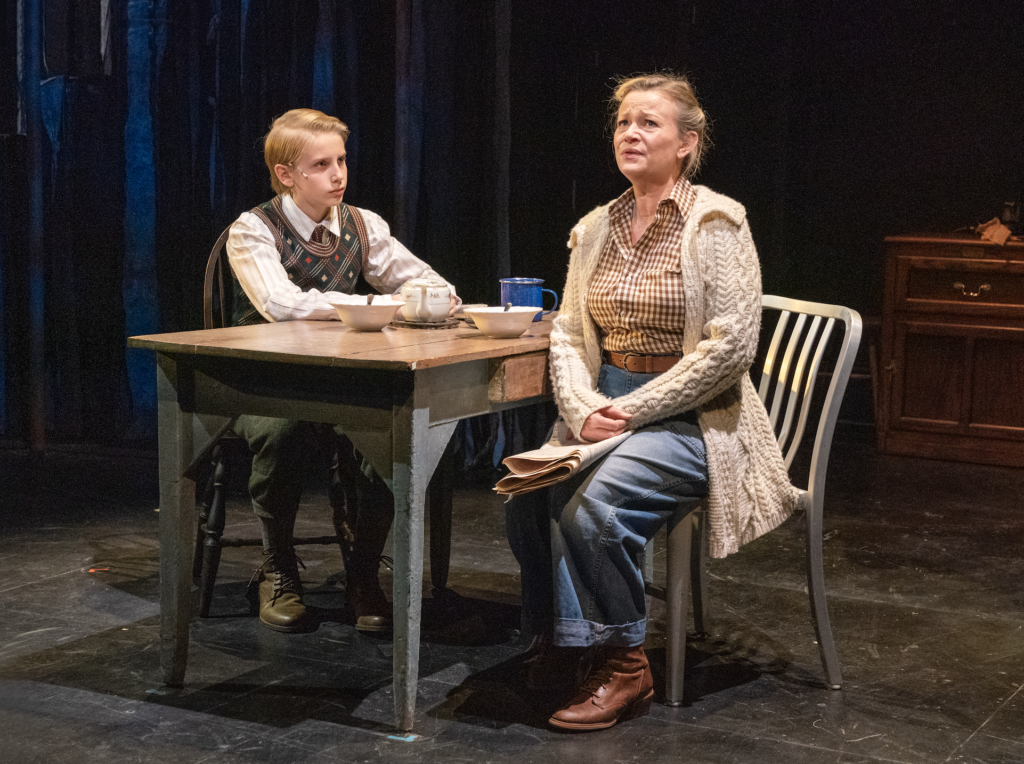
Currently on at 59E59 until February 6, The Civilians’ newest show Whisper House is a 90-minute musical that transports you to the coast of Maine in 1942 along with Christopher (Wyatt Cirbus) as he moves in with his Aunt Lily (Samantha Mathis) after his father’s death in the war and his mother’s subsequent breakdown. Cirbus breathes the emotional range of a traumatized adolescent into the character as Christopher tries to find his place in the world – wanting to take care of his mother, settling into the lighthouse, avenging the death of his father – while processing all the emotions that come after loss. As if that isn’t enough, Christopher is made privy to the secrets that surround him and must decide how to navigate them.
First, Christopher becomes aware of the ghosts which haunt the lighthouse, contradicting his Aunt Lily his first morning with “I heard them.” In washed out 1920s party garb, courtesy of costume designer Linda Cho, and desaturated makeup, Alex Boniello and Molly Hager deliver riveting performances of the ghosts’ plethora of songs and sobering amoral perspective. “Every time they retreated, I wanted them back immediately,” wrote Lane Williamson. Elysa Gardner had a similar thought in her review, writing “they’re among the most alluring and spiteful spirits you’re likely to have encountered.” Hager and Boniello deliver siren songs, luring the rest of the cast into temptation and to the water as much as they lure in the audience from behind razor-sharp smiles. Their power is not that of the ghost that makes you want to run and hide; it’s of the ghost that wants to lead you to creating your own downfall.
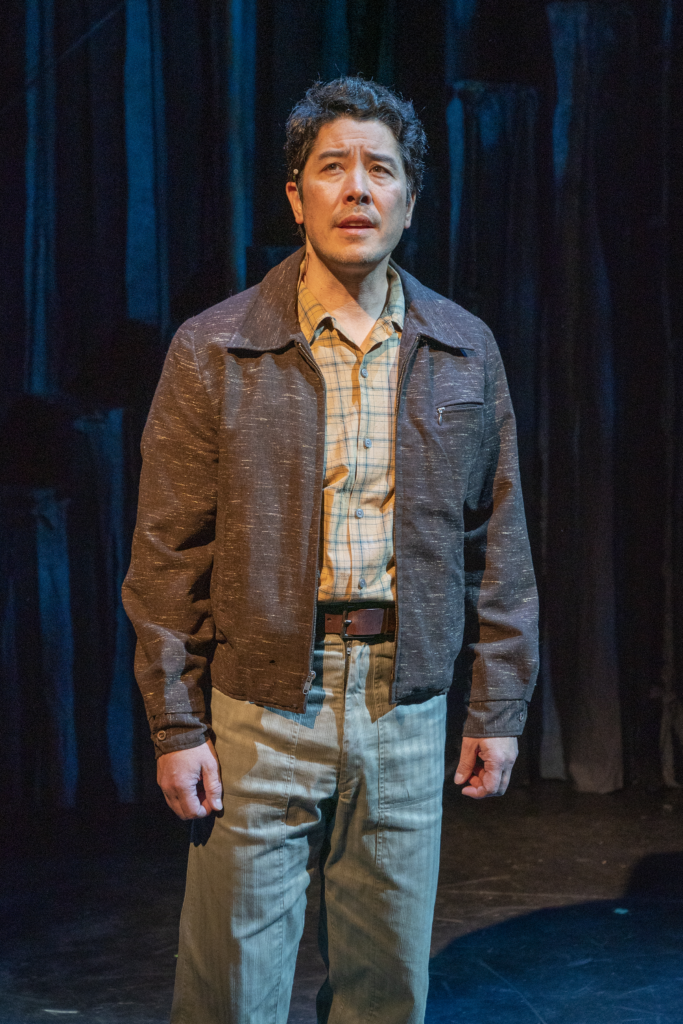
They may be the only ones we see, but they are not the only ghosts in this tale. The ghosts of Christopher’s father and mother haunt him; they fuel his hostility towards Yasuhiro, a Japanese expat who works at the lighthouse and is played with precision by James Yaegashi. Yasuhiro carries his own specters, those of a lost wife and home that carried him to Maine where he himself has worked hard to become living cellophane in the face of racism as he describes in the poignantly named track “The Art of Being Unseen.”
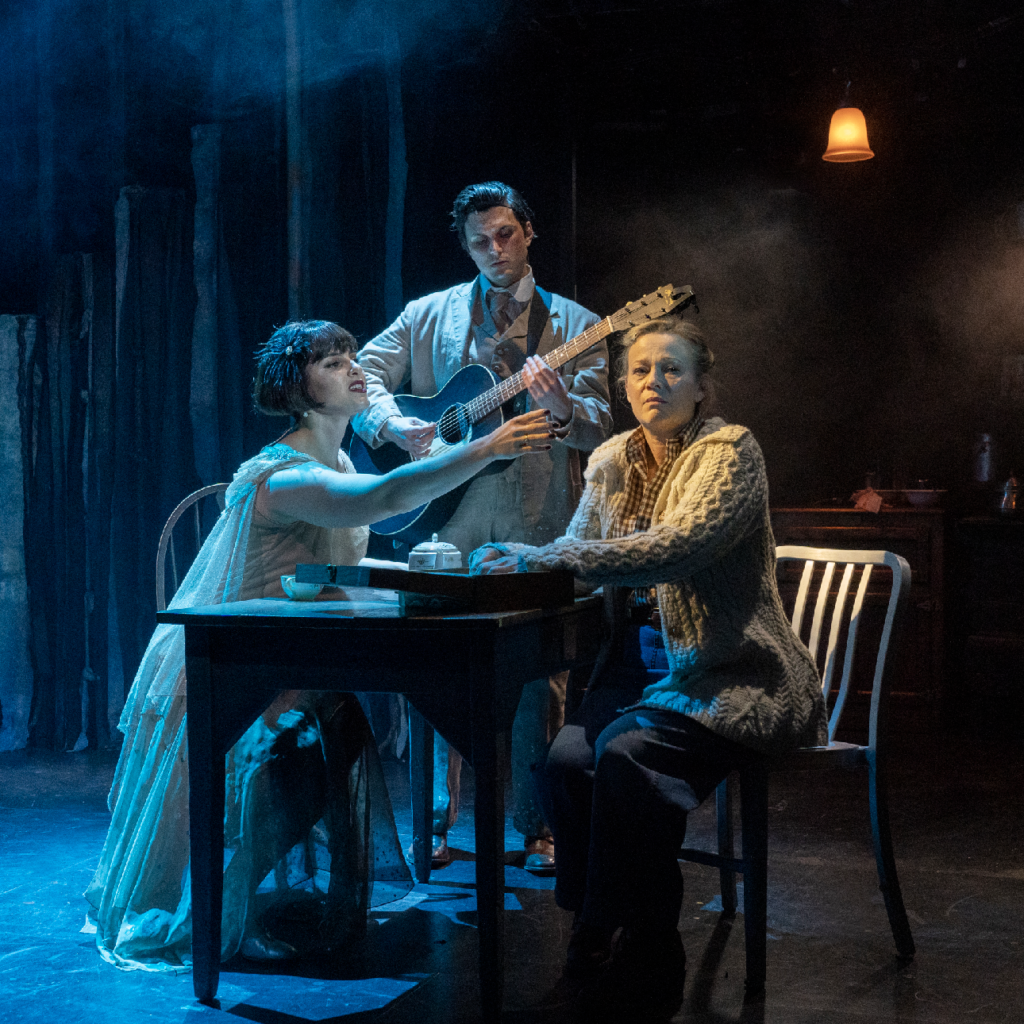
Aunt Lily’s ghosts are ever present for her as we learn exactly how Boniello and Hager’s 1920s phantoms died – and what has kept Aunt Lily at the lighthouse all these years. The burdens that rest on Aunt Lily’s shoulders are played with a particular stoicism, gruff humor, and warm heart rarely seen in female roles and expertly portrayed by Samantha Mathis. The only ghosts who remain truly unknown to the audience are the ones who haunt the friendly, but xenophobic, local sheriff, impeccably performed by Jeb Brown.
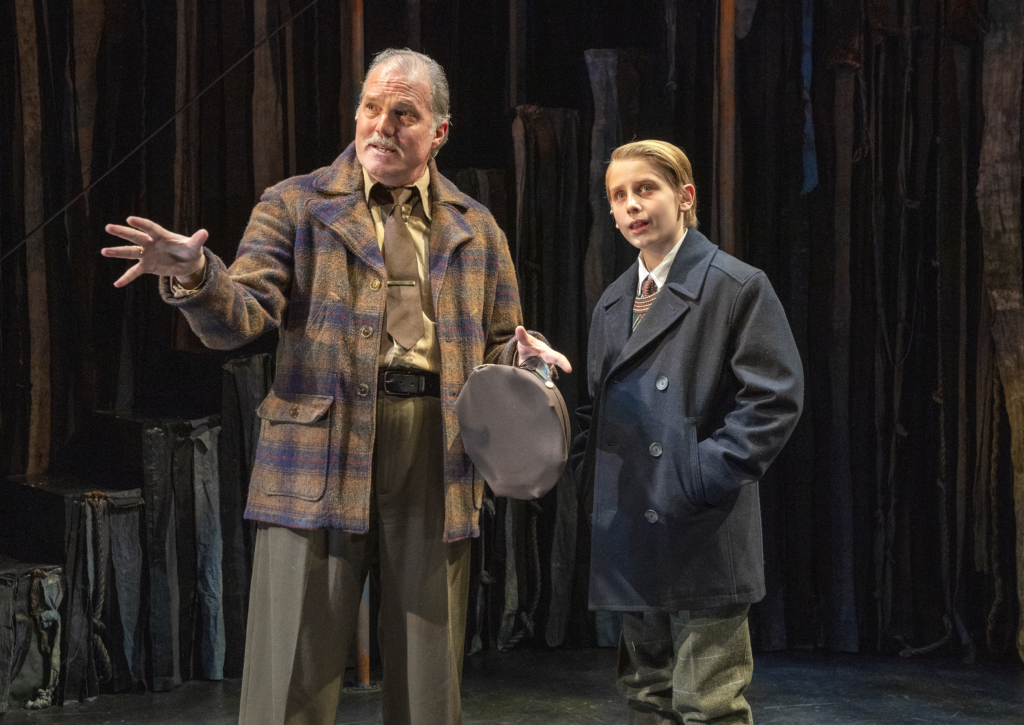
No ghost story is complete without the right atmosphere and, as Alexis Soloski wrote for The New York Times, “it has mood for days.” Set designer Alexander Dodge evoked the fraying liminality of the lighthouse with a curved set decked out in strips of charcoal fabric with pieces of rope and fishing nets interspersed and nautical lights lining the walls. The textured and vertically-strong visuals combine with the work of lighting designers Jorge Arroyo and Jeff Croiter to evoke a watery cathedral – and a watery grave. The characters travel to the water’s edge with the help of stage fog and live through a battle between the U. S. Navy and a German U-boat realistically created using strobe lights with intention and the incredible sound design of Ken Travis.
And let us not forget, Whisper House is a musical. It has been in development for quite some time, and the result, according to Lane Williamson, “is Sheik’s most enjoyable score in years.” Elysa Gardner had a similar view, writing “the score is enchanting, with Sheik and Jason Hart’s orchestrations layering piquant horns and clarinet over a spare folk-rock foundation to sumptuously theatrical effect”; blending “pop balladry with folk,” as Alexis Soloski put it, the score has Sheik’s “very particular mix of romanticism and cynicism.” As for Kyle Jarrow’s book, Brian Scott Lipton brilliantly captures it with his view that it “unfurls with the elegance of a finely crafted short story, as it details the changing lives of its central characters.” Lane Williamson also caught that particular focus within the book, stating “we meet Christopher, Lily, and Yasuhiro only at a time of upheaval. We don’t get to know them outside of this, but Jarrow still finds a way to show that there’s a lot more life under these dampened souls.” This is not an epic of a musical; it is a snapshot at the exact moment in which lives are utterly altered.
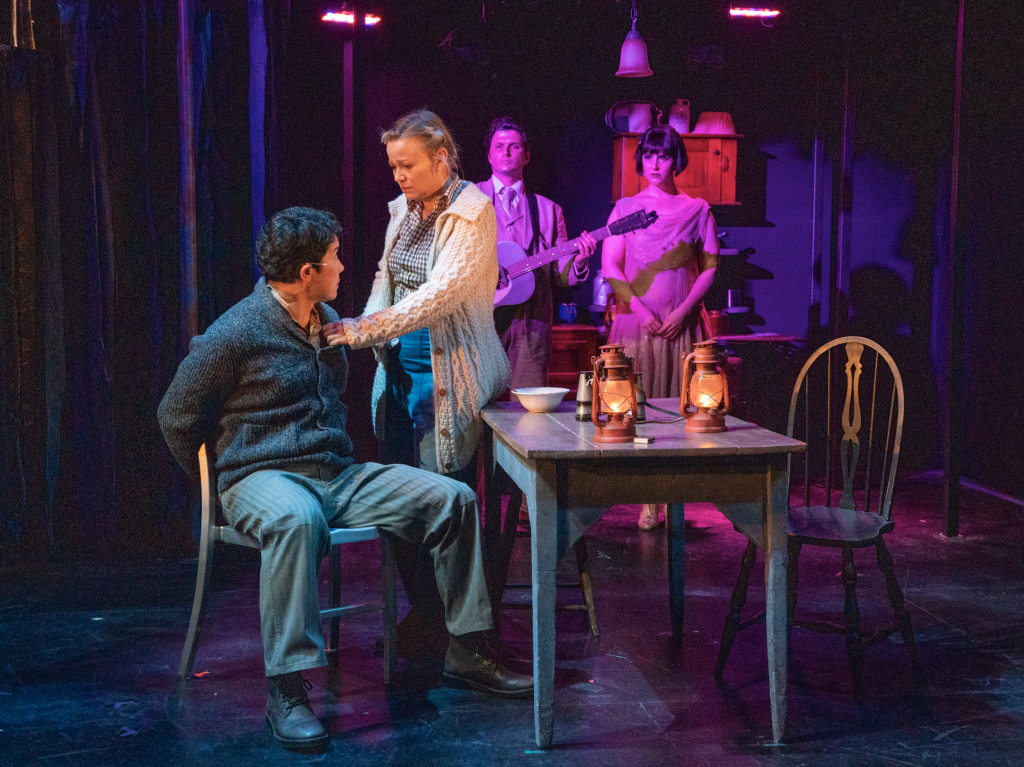
So what is meant to linger with us after we leave the theater, whispering on the edges of our mind? For Zachary Stewart in his review for TheaterMania, Whisper House delivers a warning “about the atrocities that have been committed in the name of ”public safety” (a message that is sadly as relevant as ever).” For Alexis Soloski, “the ultimate theme of Whisper House is that we must love another or die, a comforting thesis in a moment that demands – in every auditorium – so much mutual faith and care.” Though Soloski adds a caveat: “then again, there are the paired, smirking ghosts to imply the contrary. Turns out you can love another and die.” The ghosts leave us with the parting words “we don’t believe in you.” It leaves us with the unsaid question: do you believe in yourselves?
Extended Play is a project of The Civilians. To learn more about The Civilians and to access exclusive discounts to shows, visit us and join our email list at TheCivilians.org.
Author
-

Leah Putnam (she/her) is a dramaturg from outside of Philadelphia, Pennsylvania. Prior to joining The Civilians, she worked as a dramaturg for Live Arts in Charlottesville, Virginia and has worked on developing new work with writers including LET GO OF ME by Kelley Van Dilla. She is particularly passionate about immersive theater and also has a background in costumes. Leah completed her MA in English at UVA and her BA in English at NYU.
View all posts


